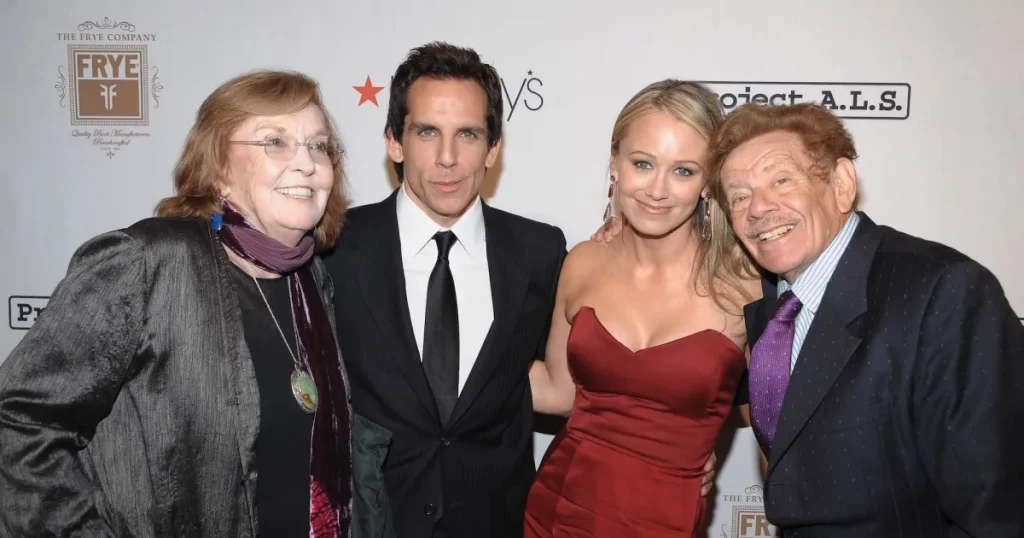The Enduring Legacy of Stiller & Meara: Comedy, Family, and Vulnerability
In the 2025 documentary “Stiller & Meara: Nothing Is Lost,” Ben Stiller offers an intimate glimpse into the lives of his parents, Jerry Stiller and Anne Meara, revealing both the brilliance and complexity of their six-decade partnership. The comedy duo, who dominated stages across America throughout the 1960s and ’70s, left an indelible mark on comedy while simultaneously navigating the challenges of raising children in the spotlight. Ben’s candid reflections portray a household filled with love and creativity, but also tension—”raised voices” were common in a marriage between two passionate artists who were “very close but also very different.” Their story transcends mere celebrity biography, touching on universal themes of love, addiction, artistic passion, and the sacrifices families make for creative pursuits.
Jerry Stiller’s journey from World War II veteran to comedy legend began after studying at Syracuse University and performing in New York theater productions in the early 1950s. His fateful meeting with Anne Meara in 1953 sparked not only a lifelong romance—they married the following year—but also one of comedy’s most successful partnerships. As early members of Chicago’s groundbreaking Second City improv troupe, they helped establish an institution that would later launch countless comedy careers including Bill Murray, Tina Fey, and Stephen Colbert. The couple became fixtures on “The Ed Sullivan Show” during the 1960s and even hosted their own syndicated program following “Saturday Night Live.” Jerry’s later career included his Emmy-nominated role as Frank Costanza on “Seinfeld” and his beloved portrayal of Arthur Spooner on “The King of Queens.” He frequently collaborated with his son Ben in films like “Zoolander” and “Heavyweights,” maintaining creative connections within the family until his death from natural causes in May 2020 at age 92.
Anne Meara’s path to comedy stardom emerged from profound personal tragedy—her mother died by suicide when Anne was only ten years old. This early trauma shaped her life and art in ways that would only be fully explored decades later. As a teenager, Meara studied under the renowned acting teacher Uta Hagen at New York’s New School, originally focusing on dramatic acting before her husband encouraged her to try comedy. “Jerry started us being a comedy team,” she once revealed. “He always thought I would be a great comedy partner.” Beyond her work with Jerry, Meara established herself as a formidable talent in her own right, earning four Emmy nominations and winning a Writers Guild of America Award for co-writing the 1983 TV movie “The Other Woman.” Her television resume included memorable roles on “Rhoda,” “Archie Bunker’s Place,” “ALF,” “Sex and the City” (as Steve Brady’s mother), and “The King of Queens” alongside her husband. Throughout her accomplished career, however, Meara battled alcoholism and other health challenges before passing away in May 2015 at age 85 after suffering multiple strokes.
The documentary reveals Ben Stiller’s complicated relationship with his parents, particularly focusing on his father’s handling of his mother’s alcoholism. “When she was drinking, my dad never really knew how to handle it,” Ben explains with remarkable vulnerability. “I think he loved her so much and he was so committed to her. Also the act and what they did together was so important, that he had to figure out how to deal with that on his own. But I think I resented him for not acknowledging it to us.” This resentment coexisted with Ben’s certainty that his father “loved us more than anything,” creating an emotional complexity that many children of artists and addiction might recognize. The documentary doesn’t shy away from these difficult realities, presenting a nuanced portrait of family dynamics shaped by both creative brilliance and personal struggles. Ben recalls being “angry at him for not being there for us,” a sentiment that took years to fully understand and process.
Despite these challenges, the documentary also celebrates Anne Meara’s eventual sobriety and the profound healing that emerged from her recovery. Ben’s wife, Christine Taylor, shares touching memories of her mother-in-law’s support during her early years of motherhood. “She would see me as a new mother, during those moments where it was crazy and frenetic, and tell me how great a job I was doing,” Taylor recalls. “It was a way to make me feel so good about what I was doing, but [also] her acknowledging what she couldn’t do.” This poignant observation highlights Meara’s growth and self-awareness, her ability to recognize her own past limitations while offering genuine encouragement to the next generation. Her journey through recovery allowed her to become the mother and grandmother she perhaps couldn’t fully be during her struggles with alcoholism, bringing a redemptive quality to the family’s story across generations.
In discussing “Stiller & Meara: Nothing Is Lost” with Time magazine, Ben Stiller reflects on the double-edged sword of growing up with famous, creative parents. “When people see the movie, you can see how organic it was for my sister and I to be a part of this world,” he notes. “It was our reality and it’s what we grew up in and we loved it when we were kids. The flip side was, it took our parents away from us, which any creative endeavor does. You have a creative parent, part of them is going to be dedicated to their creativity, if they’re a real artist. They can’t deny that.” This thoughtful observation captures the inherent tension many artistic families face—the same passion that produces remarkable work and inspires the next generation can also create absences and divisions at home. The Stiller family story, with all its triumphs and struggles, ultimately stands as a testament to the enduring power of honesty, healing, and the complex love that binds families together, especially when they have the courage to acknowledge that in life and art, nothing is truly lost.


